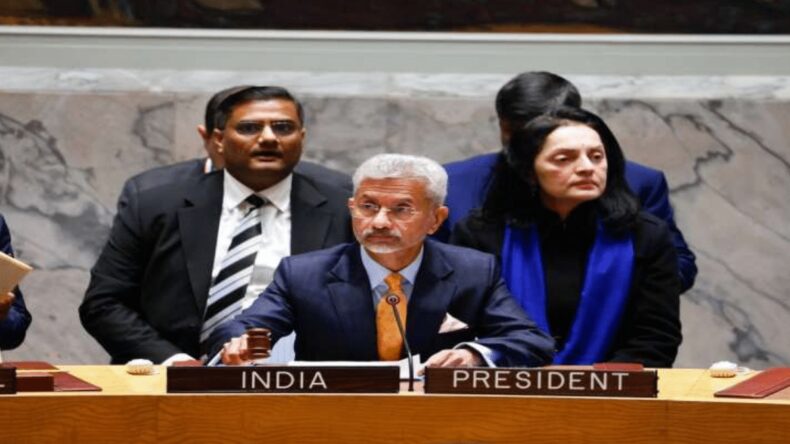On Wednesday, External Affairs Minister (EAM) Jaishankar registered verbal assault against Pakistan and China to the United Nations Security Council (UNSC).

External Affairs Minister (EAM) S. Jaishankar said that state sponsorship of inter terrorism should never be justified because the entire community deems it to be reprehensible in a hidden attack on Pakistan. He also brought up the strike on the Indian Parliament and Pakistan’s “hosting” of Osama Bin Laden, the leader of Al-Qaeda.
The Kashmir issue was bluntly brought up by Bilawal Bhutto Zardari at a UN meeting on multilateralism in New York. Kashmir was referred to by Bhutto as a “unfinished agenda”.
Jaishankar Statements
Jaishankar pointed out that the UN’s reputation hinges on how well it handles the major problems of the day, whether they be pandemics, conflicts, climate change, or terrorism.
He went on to remark, “Today, we’re concentrating on how urgent multilateralism reform is. The UN’s reputation hinges on how it responds to the major problems facing the world today, whether they be terrorism, pandemics, conflicts, or climate change. Our discourse must never accept the normalisation of such threats as we look for the appropriate response.”

Jaishankar continued his statement while addressing Pakistan and further added; “The question of justifying what the world regards as unacceptable should never arise. That also remains true for hosting Osama Bin Laden and bombing a neighbouring Parliament, none of which can be used as justification for preaching before this council.”
The ripple effects of conflict situations have made a strong case that it cannot be “business as usual” in the diplomatic and economic sphere while presiding over the UN Security. According to Jaishankar, the council will hold a debate on “Maintenance of International Peace and Security: A New Orientation for Reformed Multilateralism.”
Reform is necessary now, according to Jaishankar, who spoke before the influential Council of 15 nations. And I have no doubt that the Global South, in particular, shares India’s will to endure, he added.

“We are all aware that the issue of Equitable Representation on and Increase in the Membership of the Council has been on the agenda of the UNGA for well over thirty years.” While the reform debate has gone on, the real world has radically changed.”
In his address, Jaishankar criticised China as well. He remarked, “Multilateral platforms are being utilised to excuse and shield perpetrators on the subject of terrorism, even as the world is coming together with a more collective reaction.”
His statements appeared to be a reference to China and other permanent UN Security Council members with veto power who have consistently delayed and opposed calls for the blackballing of terrorists in the sanctions council, especially those based in Pakistan like Masood Azhar, the head of Jaish-e-Mohammed.

Pakistan’s Statement
According to Pakistan’s foreign ministerBilawal Bhutto Zardari, the UNSC is primarily in charge of preserving world peace and security.
“The best strategy for advancing peace and resolving disputes is multilateral solutions that fall under the purview of the security council. Parties to a dispute are unable to support multilateral processes one day, multilateral reforms the next, insist on bilateral channels the following, and ultimately impose unilateral acts “Without mentioning Jammu and Kashmir by name, he said.
As per Bhutto, Pakistan firmly believes that the Security Council’s active participation may help to settle key security issues, especially those in its region. The UN charter should be constantly and widely upheld as the cornerstone of multilateralism, he continued.
In response to requests for India to join the Security Council, Bhutto remarked “The chances for the vast majority of UN member states to be represented on the Security Council will be substantially diminished by the addition of new permanent members to the UNSC. The sovereign equality of all must be upheld, not the superiority of some.”
Pakistan has discussed its bilateral issues on the UN platform, which is intended for international agenda, repeatedly. India answers in kind and condemn its exploitation of the UN stage.












